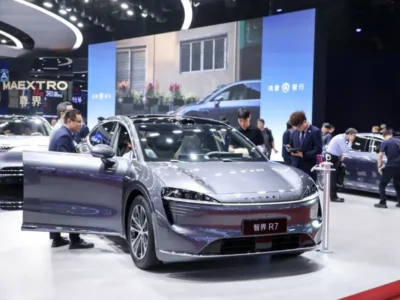Carmakers Vie for Huawei’s Qiankun Intelligent Driving as “Huawei-Era SUVs” Battle Intensifies

Huawei’s Qiankun Intelligent Driving and Harmony Cockpit are no longer exclusive to the “Jie-series” models.
As China’s homegrown NEV brands go “all in on smart tech,” multiple automakers are actively embracing Huawei, racing to be the first to equip their vehicles with the latest Qiankun Intelligent Driving system. The covert war among “Huawei-era SUVs” is heating up, with prices now dipping from the 300,000–500,000 yuan range to around 200,000 yuan.
The recently launched Voyah FREE+ on July 12 is a prime example. As the industry’s first model equipped with Huawei Qiankun Intelligent Driving ADS 4.0 and HarmonySpace 5.0 cockpit, the Voyah FREE+ offers three variants. According to the plan, the ADS 4.0 system will receive its first OTA update within three months of deliveries.
China Business Journal learned that beyond Huawei’s Harmony Smart Mobility “Five Jie” series (AITO, Luxeed, Stelato, etc.), models featuring Qiankun Intelligent Driving and Harmony Cockpit are rapidly expanding from sedans and SUVs to MPVs and even off-road vehicles.
This year marks the mass adoption phase for intelligent driving systems in China. However, industry insiders note that as most mainstream automakers partner with Huawei, Qiankun Intelligent Driving will no longer be limited to Harmony Smart Mobility products. Securing early access to the latest system has become a key strategy for automakers to boost product appeal. Competition among similarly priced and positioned models will intensify, though whether they can replicate AITO’s “sales miracle” remains uncertain.
Dongfeng Ramps Up “Huawei Inside” Strategy
Mengshi Technology, another premium NEV subsidiary under Dongfeng Motor, is also fully integrating Huawei’s intelligent driving solutions.
On July 17, Mengshi unveiled its second civilian model, the M817, following the 917. Priced at 329,900 yuan (Pro) and 359,900 yuan (Max), the M817 is Mengshi’s first full-stack Huawei-powered intelligent off-road SUV, targeting urban commutes, suburban trips, and long-distance travel. Beyond ADS 4.0 and HarmonySpace 5.0, it incorporates Huawei’s Qiankun Vehicle Control, Qiankun Cloud, and WhaleFin Communication solutions.
“China’s off-road SUV sector has entered the smart off-road era,” said Cao Dongjie, CEO of Mengshi Technology, highlighting how advanced smart tech and NEV capabilities meet diverse user needs.
Prior to the M817, Voyah models like the Dreamer, FREE+, and the upcoming Zhiyin (set for late August launch) have all adopted Huawei’s systems. The Zhiyin, co-developed over 13 months, features joint tuning for intelligent driving, cockpit, chassis, powertrain, and comfort.
Can the Sales Miracle Be Repeated?
Huawei’s intelligent vehicle solutions debuted commercially in 2021. By April 2024, its Qiankun brand had rolled out three major iterations.
“Qiankun Intelligent Driving now boasts over 700,000 active users, with 3.5 billion km of assisted driving and 230 million smart parking maneuvers logged,” said Jin Yuzhi, CEO of Huawei’s Intelligent Automotive Solution BU.
Seres, the maker of AITO, has been the biggest beneficiary. AITO’s M5/M7/M8/M9 series has surpassed 700,000 users. The Voyah Dreamer Qiankun Edition also saw rapid sales growth, with June deliveries hitting 10,053 units (+83% YoY). The Dreamer led the NEV MPV segment with 8,300 units sold at an ASP exceeding 390,000 yuan.
The Voyah FREE+ also had a strong start, securing 11,583 firm orders within 15 minutes of launch. Similarly, the Mengshi M817 garnered 9,713 pre-orders in one hour post-presale.
Huawei’s partnerships now span 11 automakers and 15+ brands, including Avatr, Voyah, Mengshi, SAIC-GM-Wuling, and Chery Jetour. Beyond NEVs, Audi’s upcoming A5L sportback (first Huawei-powered ICE car) and Q6L e-tron will feature Qiankun systems, followed by mainstream models like the A4/A5/Q5.
Challenges Ahead
As more models adopt Qiankun tech, differentiation becomes critical. While AITO remains Huawei’s sales pillar, its momentum has slowed. The Luxeed R7 (a Huawei-Chery JV) saw monthly sales drop from 11,422 in January to 3,194 in June, while the S7 managed only 4,503 H1 deliveries.
“With automakers all-in on smart tech, no single feature can sustain a brand’s edge,” analysts caution. “Competitiveness now hinges on holistic strengths—manufacturing, supply chains, user services, and ecosystem integration.”

NOTE:
Original article link: “https://baijiahao.baidu.com/s?id=1838019316181893017&wfr=spider&for=pc“.
Disclaimer: The above content is reposted from other media by this website for the purpose of conveying additional information and does not represent the views of this website. If there is any unintentional infringement of copyright, please contact us, and this website will take active measures such as removal or blocking.

 Language
Language